We all hit brick walls sooner or later; our genealogy research comes to a complete halt and we can’t go any further. I thought it might be helpful to list a few reasons why this might have happened. So here are 28 reasons why your genealogy research on a particular line isn’t going anywhere.
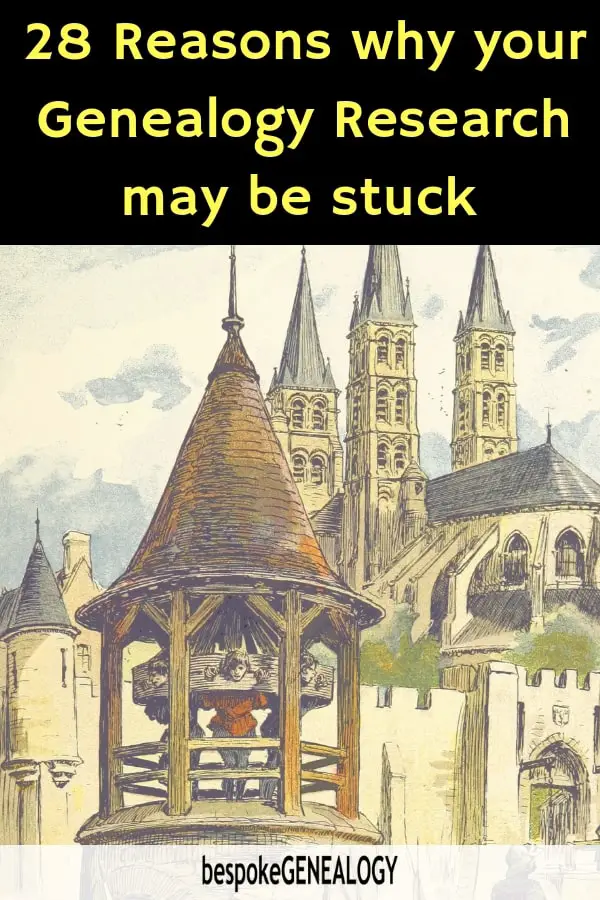
You haven’t talked to all living relatives and acquaintances
When starting a family history project, most genealogists will recommend beginning by writing down everything you know and then talking to (or emailing) all surviving relatives. Not just direct relatives (parents and grandparents), but also aunts, uncles and cousins. Even cousins younger than you may have inherited useful documentation, or know something that you don’t about the family.
It’s also a really good idea to talk to people still living that knew your recent ancestors. For example, if your grandparents are no longer around but your grandmother’s best friend is still alive, then if you can talk to her, you may pick up some useful information and maybe some photographs you haven’t seen before.
For some possible questions to ask a relative or acquaintance, see: 10 Steps for Starting Your Family Tree
You haven’t researched each person thoroughly
It’s often tempting not to thoroughly research a person on your tree if you know who their parents are. I understand that, you want to see how far back you can go. But by not looking in detail at someone, you may miss an important fact that can help you go back further. For example, you could miss a census return that that has a grandparent or other relative listed which you may not have found otherwise.
Incidentally, I’m using the latest version of Family Tree Maker (2017) which allows you to colour code the people on your tree. I have a traffic light system in place; green means someone has been well researched and I have plenty of documentation, orange for someone with some research done and red with very little done. I can now see at a glance which people I have to work on.
You’re not keeping a genealogy research log
A research log is a very effective way of keeping track of your searches, whether online or in archives. It can save you from wasting time by repeating searches again and again.
You can download a free research log (as well as other forms and charts) when you sign up for updates at Bespoke Genealogy; see the top of this page.
You’re not getting help and advice
Genealogy research can be a lonely business, especially if the rest of your family is not really interested. You can often get round a problem by discussing it with someone else with a similar interest. Joining a local Family History Society, if there’s one in your community, is highly recommended.
There are also loads of genealogy Facebook groups that can be joined. Katherine R Willson has put together a very helpful list of them here.
And Online forums are still alive and well. Here, for example, is TalkingScot for those with Scottish roots.
You haven’t looked at indirect lines
A mistake many family historians make is to only research direct lines. However, looking at indirect lines, siblings, cousins etc can often yield valuable clues, so they shouldn’t be neglected.
Contacting living cousins is also a good idea if it’s possible as they may have information and documents that you don’t. A good way of finding distant cousins who are unknown to you but who will share a common ancestor is to join Lost Cousins.
You haven’t researched spouses
Researching the families of spouses can often reveal valuable clues. For example, you may find that you can’t find the birth record of a 3x great grandfather. From his marriage record you learn that his wife was born in another parish. By searching the baptism records of that parish you may find that the husband was also born there.
Often a bride’s family will already be known by the groom’s family and will have originally been from the same parish.
Incidentally, weddings often happened in the bride’s home parish. So if you can’t find a church marriage record, then look at registers from nearby parishes.
You’re not researching neighbours
If your ancestors were immigrants, but you don’t know exactly where they came from (maybe you just have a country), then try to look for clusters on census forms (if possible).
Often families emigrated with their friends and acquaintances from their local communities and they settled down together in their new neighbourhoods. So by tracing the family histories of the neighbours (with names from the home country) of your ancestors, you may find some useful information.
You haven’t checked other parishes
Most, if not all, of us have rural ancestors. Often we will find a family living in a particular village for many generations. Other times it’s not as easy as many agricultural labourers didn’t have steady jobs on farms. They would have to look for seasonal work wherever they could find it and this could mean looking further afield in neighbouring villages or even counties.
So, if you can’t find a church record in a particular parish, look at neighbouring parishes and counties.
You are not thoroughly checking facts
Facts, especially important ones, should always be verified with documentary evidence, preferably from more than one source. If, for example, you are using information from someone else’s online tree with un-sourced facts, evidence needs to be found to back them up. Otherwise, how do you know they are accurate?
Even information on documents is often inaccurate. For example, someone may state a particular town as their place of birth on a census return because that’s the place where they remember growing up. But they may have been born somewhere else entirely. So a birth record should always be found if possible.
You’re only using free websites
In the last few years genealogy research has exploded on the internet and is now one of the most popular online activities. There are many records that can be accessed for free, especially from the magnificent Family Search.
However, the hard fact remains that the subscription sites have invested millions in digitizing records not available on free sites. So you are more than likely going to need to access them to take your research further. These sites can be expensive, but they usually have free trials and monthly options. Some can also be accessed for free at many public libraries.
You’ve only ever used one subscription website
Different subscription sites have different records, so when your subscription comes up for renewal, I recommend checking the card catalogues of them all to see what they hold. For example, if you have Irish ancestry, Findmypast has by far the largest online collection of records from Ireland.
You’re not using archives
Possibly only about 20% of genealogy records have been digitized (its difficult to get an exact number). The vast majority of records are still in archives. So the only way to take your research further is to access these physical records. If you live too far away to visit a particular archive, local help is usually available, although this will probably cost money. Fees can start from just a few bucks for a simple document look-up by the archivist. See When You Should Hire A Genealogy Researcher for more information.
You’re not using advanced search techniques
You can often get much more relevant information from a search by using more advanced techniques such as wildcards. For example see this article on how to get the best from an Ancestry search.
You’re not searching specific collections on the database sites
I would advise to stop using the general search on the database sites as you often get too many results or not the results you need. It is usually far better to go through the card catalogues and search specific collections.
You’re not using browse only records
Following on from the previous point, many people are unaware that some collections in Ancestry and other database sites have not been indexed and cannot be searched. This is another reason why you should use the card catalogues. The only way that you will usually find a browse only collection is when you click on one and there is no search field.
You’re not making best use of Google
There is so much for genealogists on Google from advanced searching to free historical newspapers. See Are You Making The Most of Google For Genealogy? for more information.
You’re researching the wrong family
This has been touched upon in some of the previous points, but it is so easy to research the wrong family; I’ve done it myself. This often happens with common names (Christian names and surnames), assumptions made and a lack of documentary evidence.
So my advice is research each generation thoroughly before moving on to the next one and make sure that there is clear documentary evidence linking one generation with the next.
You’re not making full use of the information you already have
You may already have much more information about a person than you realize. For example, a Scottish civil birth record usually gives the parents place and date of marriage. So, from every document extract all the genealogical information you can about any family member mentioned.
If you’re interested, in 10 Genealogy Research Tips I Wish I’d Known at the Start I show how I could find very little direct information about my great grandfather, but I was able to extract a lot of information from the civil records of his children.
You’re not checking naming patterns
Many societies had (and some still do) conventions for naming children. These conventions, although not universal, can yield valuable clues for genealogy research. For example, in Ireland the tradition was to name the eldest son after his paternal grandfather, the second son after his maternal grandfather etc.
You’re not checking name variants
Until the late 19th century, most people were illiterate and could not write their own name. Documents were completed by officials who wrote down what they heard, resulting in names being spelt in many different ways.
Immigrants often used to change the spelling of their names in attempt to fit in.
You’re not looking for Latinized names
Before the 19th century, many official documents were written in Latin and names were often “Latinized”. For example Andrew would be written as Andreas. There is a list of Latinized names here.
You’re not looking for nicknames
You may often find that a common nickname was used on official documents rather than the name that a person was christened. For example, my Aunt Elizabeth was always known as Bessie and this name appears on some documents.
A list of common nicknames can be found on this Family Search Wiki.
You’re not looking for a change of name
Sometimes an ancestor can’t be found after a certain date because they have changed their name. They might be an immigrant and have made the change so that they are not obviously labelled an immigrant. Or it might be a stipulation in a will so that an inheritance can be received. There are many reasons for a change.
In the UK, changes of name are recorded in The Gazette newspaper. More information about this really useful free genealogy resource can be found here.
You haven’t eliminated other possibilities
Sherlock Holmes’ famous quote “when you have eliminated the impossible, whatever remains, however improbable, must be the truth” is as true in genealogy as it is in crime.
You could be stuck because you have several people with similar names in the same area who could be your ancestor. By investigating all of these people you can eliminate the people who aren’t your relatives which will, hopefully, leave your ancestor.
You’re not using problem solving techniques
Often using problem solving techniques can get you to approach a genealogy conundrum from a different angle and help you solve it. This Wikipedia article lists some strategies that can be used.
In my earlier post How I Break Down Genealogy Brick Walls I describe a problem solving technique I sometimes use called Alternative Scenarios.
You haven’t checked military records
Many men served in the armed forces from local militias through to state armies, navies and (later) air forces. Some records also contain details about a serviceman’s family.
See my post for more Information about British and Commonwealth military records.
You haven’t checked street name and boundary changes
The rapid growth of cities during the industrial revolution often meant that streets were extended and renamed or built over. Local government reorganization often led to municipal boundary changes, so documents may not be found where you expect them to be.
Looking at old maps is often a good way of checking for street name and boundary changes. A great source for free historical British maps is the National Library of Scotland Map Images collection.
You haven’t read about the history of the time
Often reading about the history of the times your ancestors lived in can lead to genealogy clues. For example the Highland Clearances in the north of Scotland in the 18th and 19th centuries led to a mass migration. This emigration wasn’t just to the New World but also to the urban areas like Glasgow where former crofters now worked in the mills.
I hope this all helps. Happy researching!
For further reading, you may be interested in these books:
Please pin a pin to Pinterest:

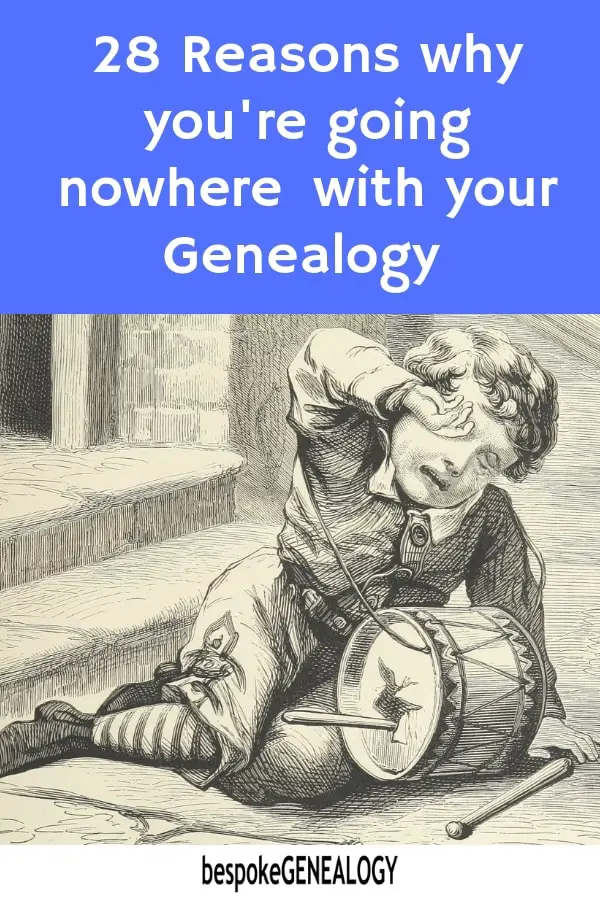
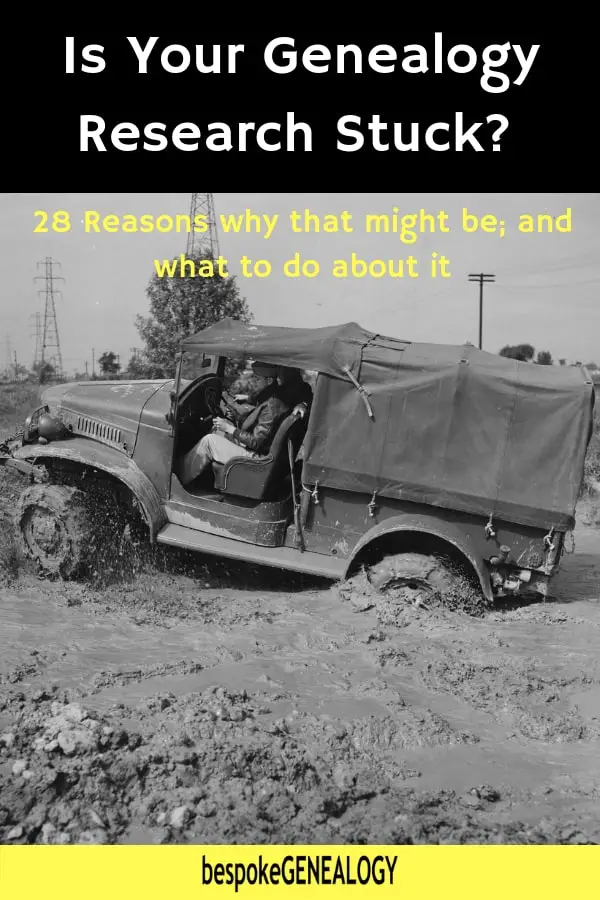
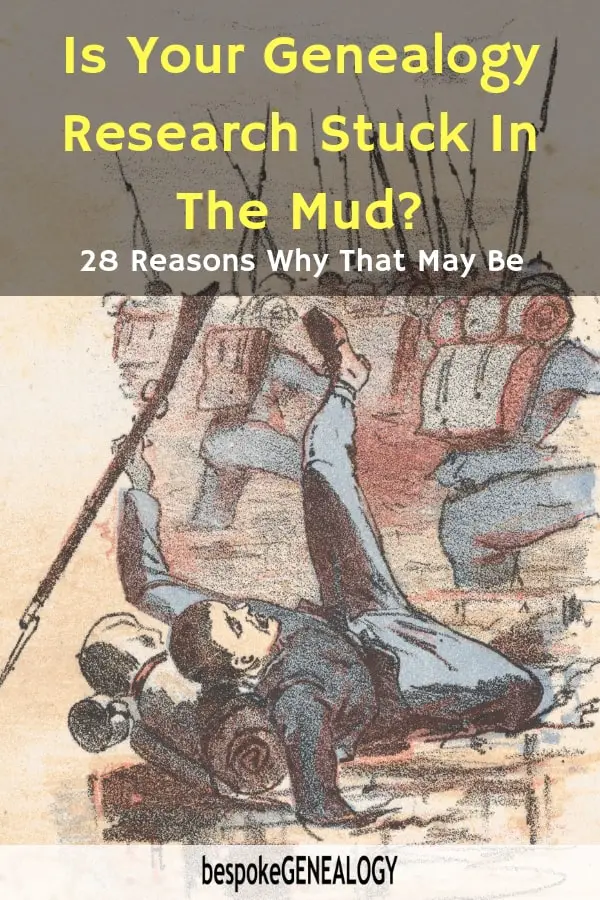
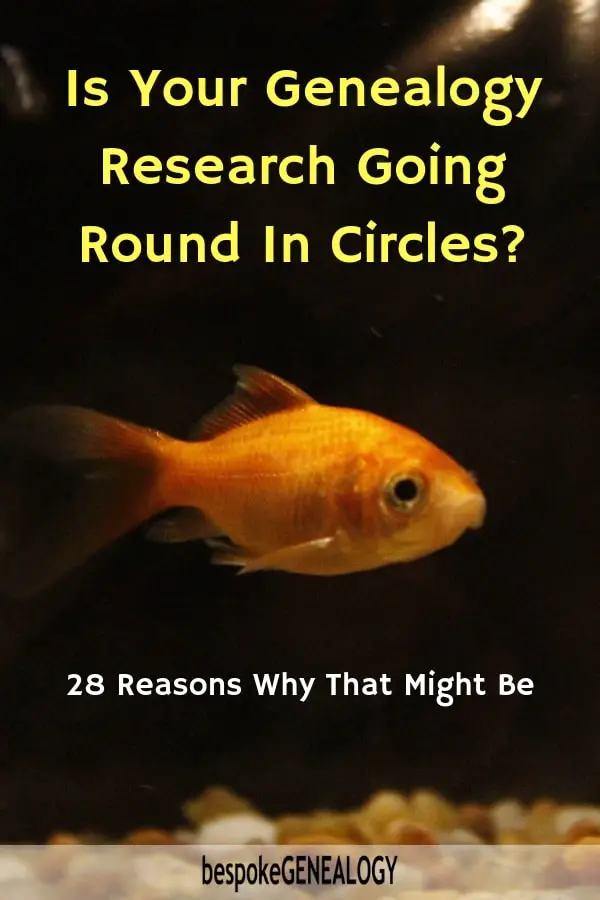
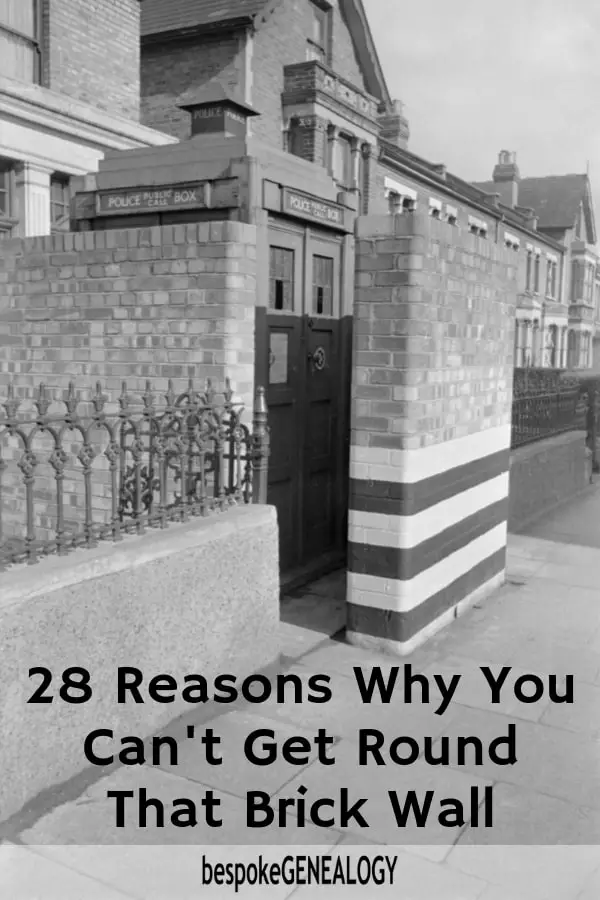
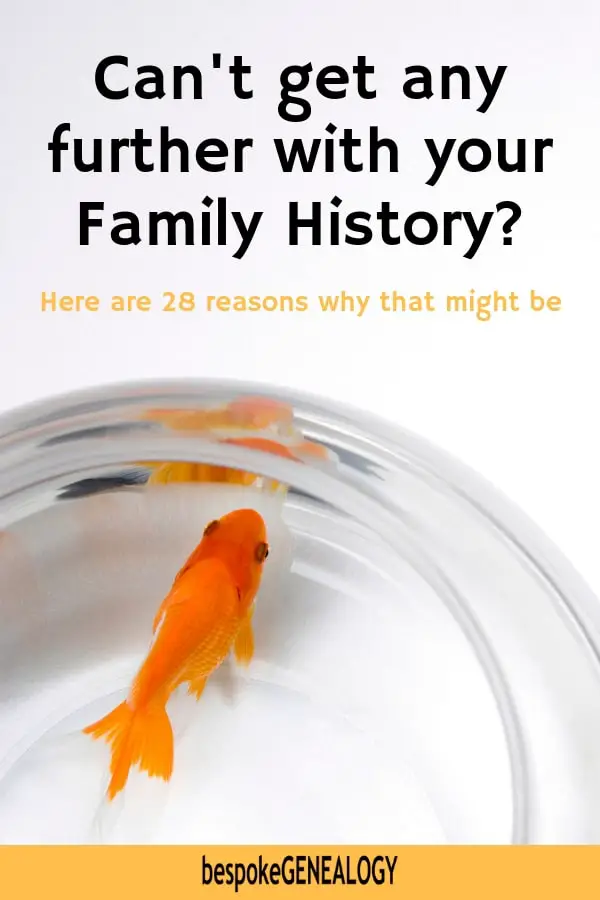
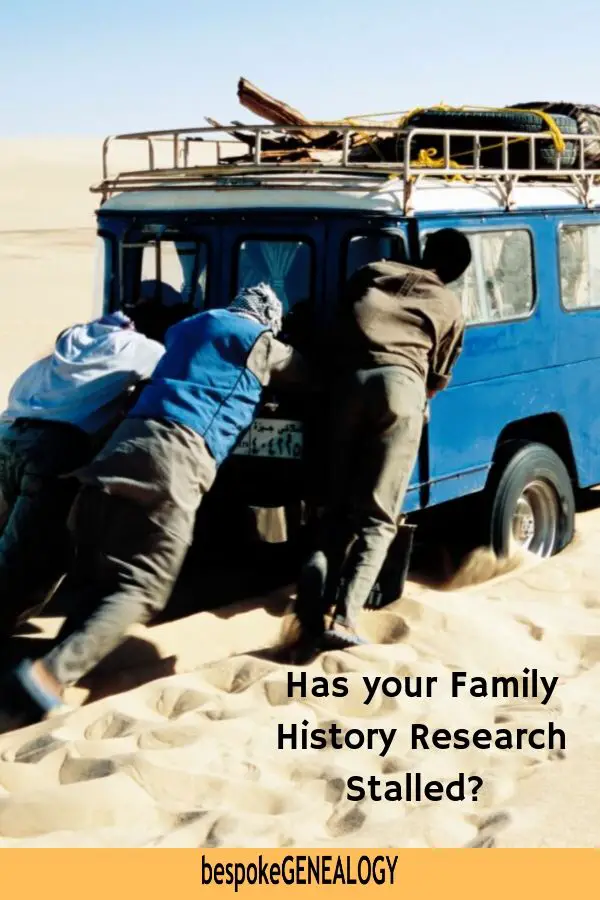


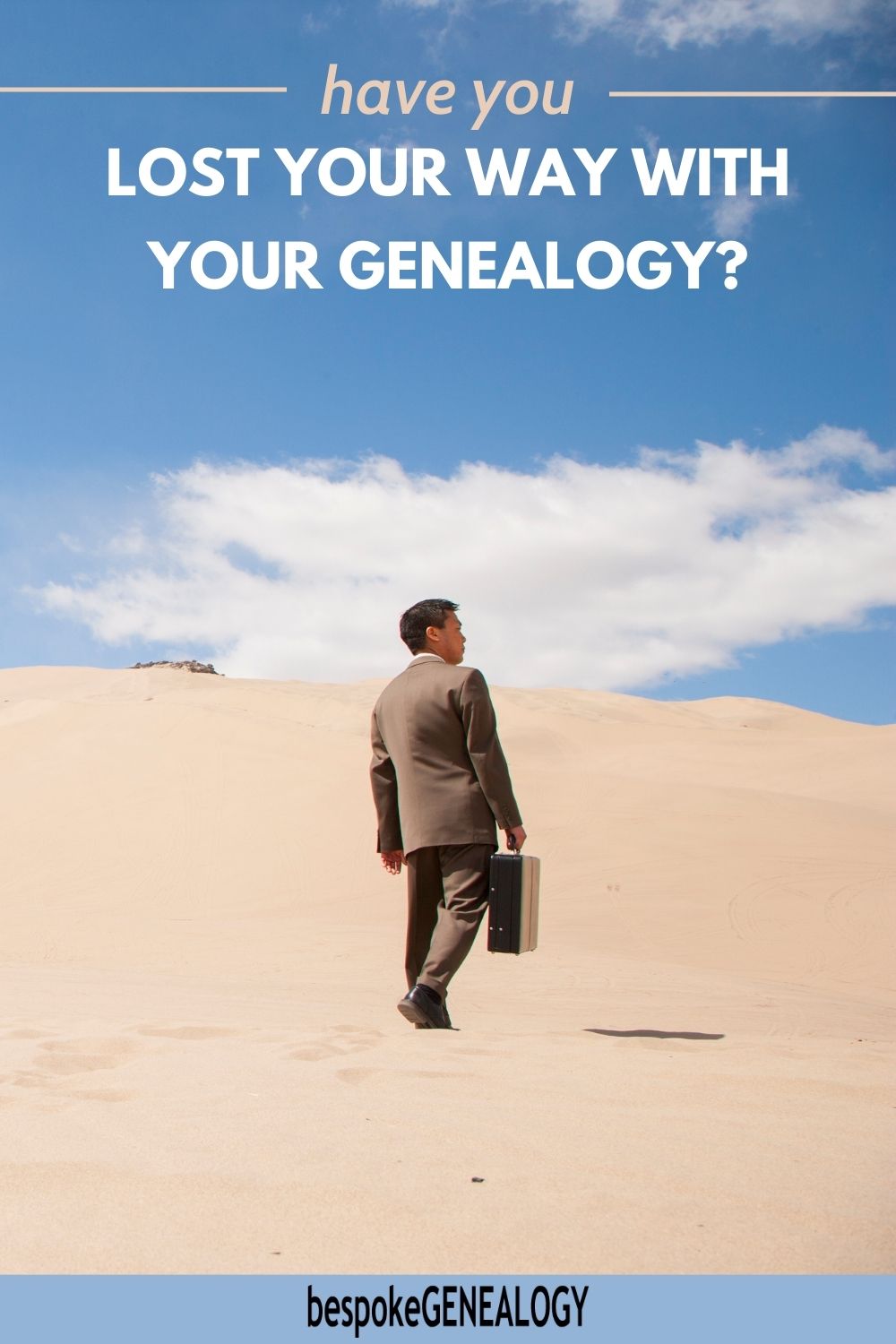

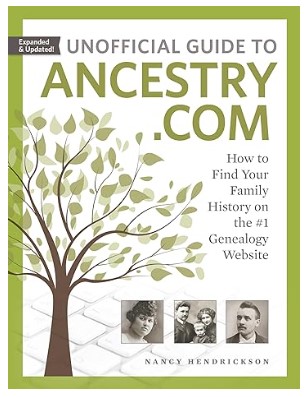
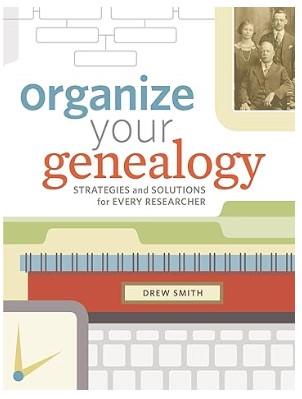
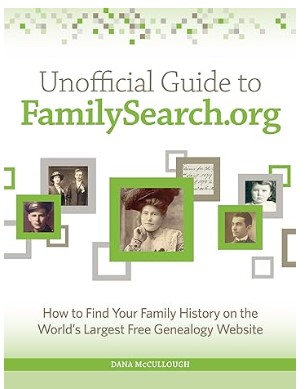
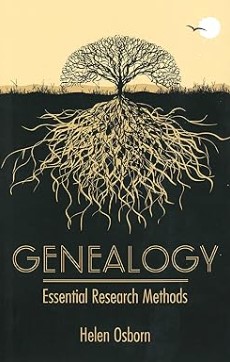
How can I find out if an ancestor changed his FIRST name? He was born around 1585 and died in 1649 in London. We believe that he converted to either a Puritan or Quaker religion when he married, and began using a Biblical first name instead of his true first name. We think the original first name was George. He is a key figure in our branch of the family tree. Where does one look for information about people who may have started using a different first name? His family was Church of England, and his son (immigrant to the colonies) was a Protestant. Somewhere in there he started using a Biblical first name. The name was never used before or since.
Hi Kathryn,
Thanks for your comment.
A change of name in the time of your ancestor will probably be difficult to find, if not impossible. However, here are a couple of areas you can try:
Puritans were mostly members of the Church of England who wanted to reform it. So, your ancestor was therefore probably a member of this church, so if parish registers survive at his church, you may find his change of name recorded, maybe on his marriage record.
Quaker records didn’t start until 1656.
If he left a will or was left property in a relative’s will, you might find his name written something like this: Abraham Smith (formally known as James Smith). So, my advice would be to try and find any documentation you can for your ancestor. You might get lucky!
Cheers
Alistair